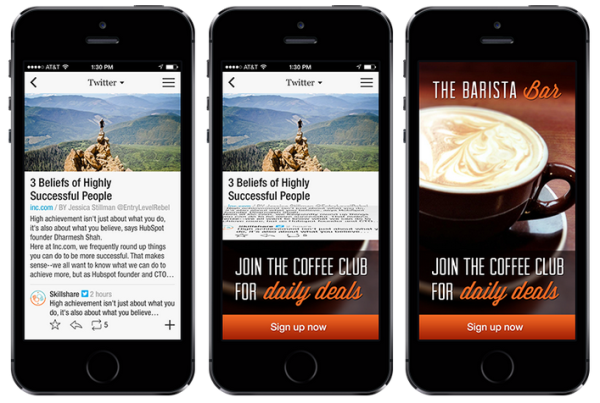Twitter’s MoPub Will Open Its Native Ad Market For Apps Tomorrow
Twitter continues to go native. Today it announced that its native ad product for mobile apps, in testing since Twitter’s $350 million acquisition of MoPub in December, will be rolled out globally on Wednesday. The product offers app developers the ability to create native ads for their own apps, an ad server to push ad […]
Twitter continues to go native. Today it announced that its native ad product for mobile apps, in testing since Twitter’s $350 million acquisition of MoPub in December, will be rolled out globally on Wednesday.
The product offers app developers the ability to create native ads for their own apps, an ad server to push ad campaigns into native inventory and an extension into OpenRTB that allows other publishers to bid on the ad units.
Twitter has long been a proponent of native ads. Promoted tweets are a prime example of the ad form, in which ads are designed to look and feel like standard content on a network or device. Twitter says they are proven performers.
“Not only are native ads a significant improvement for publisher monetization in general, but users engage with these ad formats at a higher rate than the desktop-era banners and interstitials which are so prevalent in mobile apps today,” Kevin Well, Twitter’s VP of Product and Revenue, wrote in a blog post announcing the MoPub rollout. “Because of this, monetization through native ads can deliver a considerably better experience for users and also a better ROI for marketers.”
Here’s an example of how MoPub’s native ads look in the Flipboard app:
Said Flipboard CTO Eric Feng, in a news release: “MoPub’s native ads solution lets us control the whole ad experience – from setting minimum price floors and prioritizing direct advertisers over house ads to blocking certain ad categories and limiting how often a user sees a creative. We have a level of transparency into what our users see, and control over how and when they see it.”
More details about MoPub’s native ad platform are available here.
Contributing authors are invited to create content for MarTech and are chosen for their expertise and contribution to the martech community. Our contributors work under the oversight of the editorial staff and contributions are checked for quality and relevance to our readers. The opinions they express are their own.
Related stories
